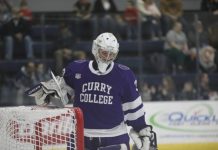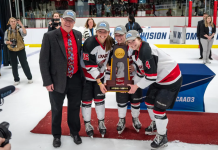Luke Beaverson’s intuition told him something was up, and it wasn’t positive.
A defenseman for the Green Bay Gamblers of the United States League, Beaverson felt uneasy about his hockey future at North Dakota as last season wore on, and his fears were realized shortly after the season ended.
Tom Morrow got tired of waiting, so he called coaches at Colorado College to find out why he hadn’t received anything from the school during the first days of the early-signing period. When Morrow learned he was back at Square One, the defenseman for the USHL’s Tri-City Storm felt angry and betrayed.
Beaverson and Morrow are both defenseman born in Minnesota, but their other link is that they both made verbal commitments to Division I colleges that went unfulfilled.
Teams across sport who sustain their runs of success are credited with reloading rather than rebuilding. In college hockey these days, things have gone a step further. The best teams don’t just reload — they stockpile talent for future deployment.
More and more, college hockey programs are entering verbal commitments with players a year-and-a-half to two years in advance. Of course, the term “verbal commitment” is an oxymoron — players and schools can rescind on verbal commitments without breaking any official rules.
— Minnesota coach Don Lucia
In some cases, the players are 15-year-old phenoms with potential bigger than their bodies. In other cases, the players are 17-year-old high school studs who have yet to prove themselves in leagues like the USHL. In both cases, the players have time to flourish or fail while their prospective college coaches watch.
The situation puts college coaches who are hired and fired for their records in a tough spot. Coaches can sign a player who didn’t develop and risk the damage to his lineup, or, the coach can rescind on the verbal commitment and risk damaging the image of his program.
St. Cloud State coach Craig Dahl: “If you have a job and you don’t do it, how long should you keep it? We always have [honored verbal commitments]. I’m not sure we always will. The best thing you can do is tell them up front that it’s a competitive situation — and we’re going to be honest with you as we see it.”
“It’s a no-win situation,” said North Dakota coach Dean Blais. “You can’t have too many situations where things don’t work out for a recruit. Hockey is a small world.”
Beaverson verbally committed to the Fighting Sioux in January 2003, some 21 months before he would ever play in Grand Forks. Members of North Dakota’s coaching staff visited Beaverson three or four times during the 2003-04 season and the message was always the same: “Show us that you’re ready to step into our lineup.”
Ultimately, Beaverson did not show the coaches enough, and it cost him the scholarship offer from North Dakota he expected to sign in April. Though not pleased with North Dakota’s decision, Beaverson conceded, “I feel there’s still work to be done. I had a terrible season.”
Morrow gave his word to the Tigers only two weeks before the school intended to sign him in November 2002. He was offered a full scholarship and told other interested schools like Michigan State that he was bound for Colorado Springs. But, when Morrow didn’t hear from Colorado College, he called to find out he was no longer in the coaches’ plans.
“There was no good reason for it at all,” Morrow said. “They wouldn’t give me any straight answers; I didn’t like the way they handled it.”
Colorado College head coach Scott Owens said Morrow was a fine player, but the staff felt it best to look for a more offensive-minded defenseman.
“We made a mistake in the assessment of what we needed for that position, the type of player,” Owens said.
Getting it right could only get more difficult. In 2002, Jack Johnson and Jack Skille made verbal commitments to play at Michigan and Wisconsin, respectively. Both were 15-year-olds at the time and neither will set foot on campus until the fall of 2005. In the last nine months, four 15-year-old players — Peter Mueller (Minnesota), Nick Grasso and James Marcou (Massachusetts) and Peter LeBlanc (New Hampshire) — already made verbal commitments to colleges for the fall of 2006.
In all six cases, the players and their families initiated contact with the schools. College coaches cannot initiate contact with players until their junior year of high school at which point the contact can only be written. However, players can initiate contact at any time and make an unofficial visit to a college. On those unofficial visits, players and coaches can meet face-to-face — and verbal commitments can be made.
“The earlier recruiting is being pushed more by the parents and the kids than the schools,” Minnesota coach Don Lucia said.
And the schools aren’t the only side backing out of verbal commitments. This fall, Lucia will be instructing talented blueliner Nate Hagemo, who originally made a verbal commitment to Wisconsin.
Both Beaverson and Morrow said they disagree with either colleges or players rescinding on verbal commitments. Morrow blamed the growing intensity of the recruiting process for young players’ early decisions.
“With some of these kids you don’t know what you’re going to get,” Morrow said. “The kids and the colleges are doing it to each other.”
(This article originally appeared in this month’s edition of USCHO Magazine.)


